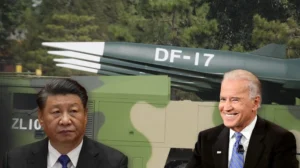
The Biden administration is attempting one of its most ambitious foreign policy moves yet: convincing the American people and a divided Congress to authorize a $105 billion supplemental spending bill to deal with a diverse set of global crises.
The president’s address to the nation on Thursday night framed this spending as a response to the vicious Oct. 7 Hamas terror attack on Israel, linked it to the ongoing war in Ukraine, and reasserted America’s global role as the “indispensable nation.” Israel featured heavily. Biden, seated in the Oval Office, promised that this spending would cement America’s “unprecedented commitment to Israel’s security” and make sure that Israel has “what they need to protect their people, today and always.”
But for all of Biden’s high-flying rhetoric, it’s hard to disguise the reality of this proposed supplemental. The administration – faced with congressional pushback on foreign policy priorities – is proposing a truly epic logroll in which more popular spending priorities like Israel are lumped together with increasingly less popular ones like Ukraine, stitching together enough things that the bill might pass even our monumentally dysfunctional congress.
The Biden administration may be right that this tactic will work. Much is dependent on whether Republicans in the House prove capable of electing a new speaker in the coming days – and on how willing that speaker is to bring this legislation to the floor.
Regardless of the ongoing speaker drama, however, the breakdown of the supplemental – and the president’s rather unconvincing attempt to rhetorically link the Israeli and Ukrainian conflicts in the minds of American voters – tells us a lot about Biden’s priorities and suggests that the administration’s foreign policy continues to drift away from strategic planning, and into a reactive, all-encompassing approach to the world.
Take a moment to consider the stunning amounts we’re talking about here. The proposed supplemental will include over $60 billion for Ukraine, around $14.5 billion for Israel, $13 for the border, and a couple of billion dollars for Indo-Pacific initiatives, including AUKUS. An additional $10 billion is being requested for flexible humanitarian response across these areas. The grand total – $105 billion dollars – is equivalent to a whopping 12% of the last DOD budget.
The move to bundle together all these priorities is reflective of a growing shift inside the Biden administration towards the idea that America can do everything, an idea that contrasts strongly with the early days of Biden’s presidency, where the administration made efforts to withdraw from Afghanistan, and to stabilize the relationship with Russia and the question of European security in order to focus on the Indo-Pacific.
Instead, the administration today pays most of its attention to Europe and, now, to the Middle East. There is no denying that Biden’s initial response to the Russian war in Ukraine was effective, helping to bolster support to Ukraine in a way that undermined Russian capabilities without risking broader conflict. But as the war in Ukraine has ground into a battle of attrition over increasingly tiny pieces of land, it has become clearer that the administration doesn’t have a good exit plan from this conflict, nor any strategy other than simply staying the course.
The breakdown of the supplemental funding request suggests that this is likely to continue. Indeed, the amount of Ukraine aid in the supplemental request is not only substantially larger than the aid request for all other contingencies in the package, but also almost as much as the United States has already sent to Ukraine since the start of the war. And as a recent publication from the Council on Foreign Relations highlights, aid to Ukraine now dwarfs that sent to any other recipient of U.S. aid, and towers over historic cases where the United States sent funds to support Israel, Taiwan, or others in wartime.
It is no surprise then that Congressional Republicans and China hawks are increasingly concerned that support for Ukraine is eating into the American ability to focus on a rising China. The president – attempting to preempt these criticisms – argued in his Oval Office speech that this spending will be broadly useful in bolstering the U.S. industrial base, regardless of where the armaments produced end up. But as recent reports have made clear, there are increasingly clear tradeoffs in U.S. support for different conflicts. The Pentagon has struggled to source ammunition to send to Israel, thanks to stockpiles depleted for Ukraine, and can expect to face more difficult choices in the future, when it faces overlap between weapons required for Ukraine, Israel, or a Taiwan or other contingency.
Perhaps the biggest problem here is the increasingly grandiose and global nature of the Biden administration’s approach to national security. Bundling together Israel, Ukraine, the border and even Taiwan in the budget supplemental may reinforce the arguments Biden made in his speech: that “there is nothing, nothing beyond our capacity,” and that America is the “essential nation.”
But the actual breakdown of the supplemental request shows the reality: the United States does face trade-offs in foreign policy. In prioritizing conflicts in Europe and the Middle East, Biden is in practice deprioritizing the Indo-Pacific, perhaps the region with the most genuinely pressing security threats for the United States itself. Congress would be wise to consider whether the breakdown of this supplemental spending bill is really the most efficient and strategic use of America’s limited resources.
Ashford is a senior fellow at the Stimson Center’s Reimagining US Grand Strategy Program.
Source link







